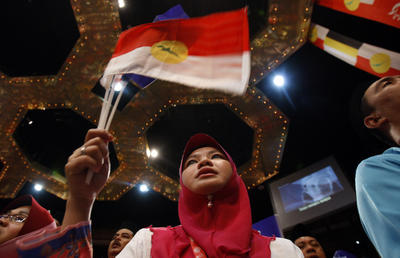These changes have been accompanied by the dominance of one party politically: the People’s Action Party (PAP) in Singapore and United Malays National Organisation (UMNO) in Malaysia. Since 2008, however, these regimes have faced increasing pressures. In 2008 the UMNO-dominated National Front lost its two-thirds majority in parliament and in three of the most developed state governments. Similarly, last year in Singapore, while holding 93 per cent of the elected seats in the legislature, the PAP experienced a sharp decline in the popular vote, losing 39.9 per cent. Are there common factors that can help explain this dominant party de-alignment and the erosion of political support? Will these parties — which now are among the longest lasting one-party dominant parties in power globally — be able to stave off their falling political support?
Part of understanding the changes in Malaysia and Singapore requires examining the dominant parties themselves. While not the complete story — as transformations in society, policy debates, rising inequality, service access and stronger opposition parties are also at play — looking inside the parties is an important place to start.
First is the move of these parties away from party-based patronage for political support toward the use of government funds and policy to shore up support. This transition is common with rising populations and urbanisation, as the move is usually toward broader policy platforms. Yet, in dominant-party systems the limited debate and public ownership of policies constrains this political transformation. As such, the PAP and UMNO have evolved into providing selective support for those they deem as necessary for the state or for the party. In Singapore, this involves close alliances with business, including multinationals that receive favourable conditions for investment and labour. In Malaysia, while a similar pro-market environment is fostered, UMNO is seen to allocate many of the privileges to itself or those loyal to them. On the ground, the impact has been a severing of the personal ties of ordinary citizens with the party, and the party’s position as a direct vehicle to assist the public has waned.
The parties’ detachment from society has contributed to the weakening of the parties’ brands. Neither the PAP nor UMNO have the same pull factor as they once did. This varies by generation, but perceiving the parties as a weaker brand is more common among young people. Expanding internet use is a contributing factor, as alternative sources of information have replaced the dominance of the state-linked media. In recent polls for example, UMNO only received a 42 per cent popularity rating. Surveys in Singapore also show a decline among younger voters, although the PAP’s favourability is above 50 per cent.
This weakening brand is making it difficult for the parties to regenerate and reconnect with their changing societies. Family connections and the use of personal networks in candidate selections contribute to the prevalence of choosing members based on loyalty and familiarity as opposed to calibre and diversity. The limitations of attracting dynamic, young leaders are enhanced by the rigid party hierarchy, and bottlenecks that exist for young leaders to rise within the system. In Malaysia, for example, talented Malays are put off by the fact that racial provocation is a mode for advancement, coupled with the widespread use of money politics. While there are some exceptions, these parties are no longer attracting the ‘best and the brightest’ in large numbers.
The limited injection of new ideas further insulates these dominant parties from the societies they govern. Malaysia and Singapore are experiencing widening inequality — both countries have among the highest inequality rates after Thailand in Southeast Asia — with the majority earning incomes well below the national average. In both countries party leaders increasingly come from the economic elite, much more so than in the past. This has reinforced the distancing of party elites from the reality of ordinary citizens and a weakening in the representativeness of these parties.
Insulation also coexists with infighting. PAP has kept its differences out of the public eye, although in 2011 there were more open acknowledgement of dissent within the party. The PAP’s differences are unlikely to emerge until there is a more fundamental change in the landscape, as Lee Kuan Yew continues to forge solidarity within his party. In Malaysia, post Dr Mahathir, the infighting in UMNO has become rampant with the ongoing struggle for power. This factionalism and internal contestation makes the party difficult for any leader to manage and has contributed to its electoral losses.
Given the ongoing de-alignment, it is not a surprise that both the PAP and UMNO use nostalgia to win votes, focusing on earlier successes. Reminiscing about ‘old Singapore’ or about UMNO statesmen have become common narratives to strengthen party support. These parties are looking to their past, but its leaders have yet to clearly articulate new visions for their parties’ future. Both national leaders, Lee Hsien Loong and Najib Tun Razak, have started to look to the future, but the place for their parties in Singapore and Malaysia’s future is not clear. There is considerable ground to recover, and part of the recovery process involves a look inside to assess how the parties themselves are contributing to their own fortunes.
Bridget Welsh is Associate Professor in Political Science at Singapore Management University. Professor Welsh presented her research at this Year’s Malaysia and Singapore Update at the Australian National University. Video footage of the event is available here.

